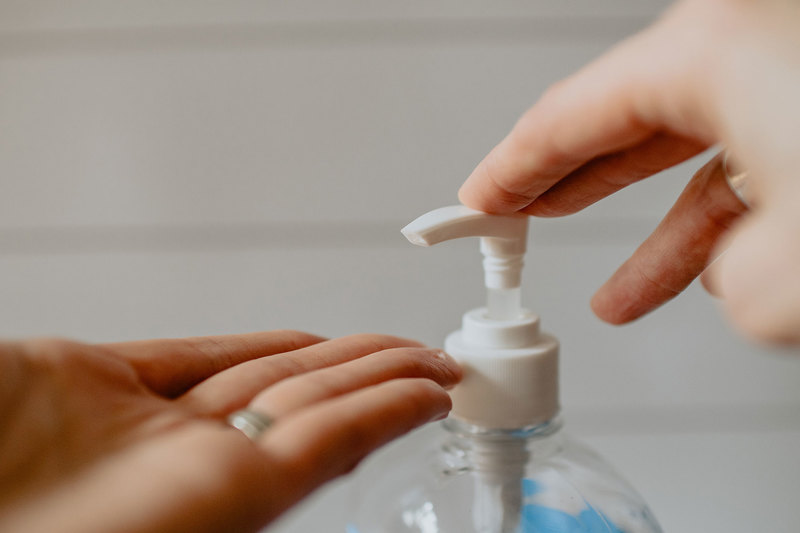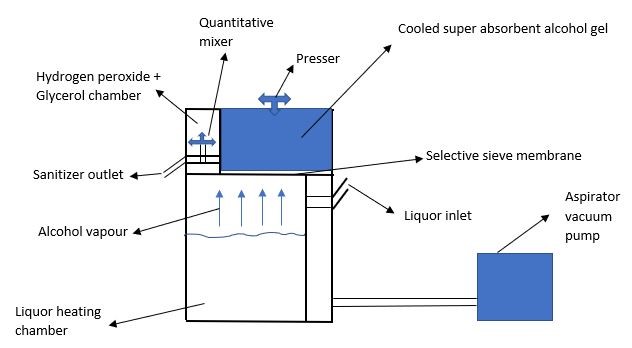Students’ portable hand sanitiser distiller
23 April 2020 | Story Helen Swingler. Read time 3 min.
When the Faculty of Engineering & the Built Environment’s Professor Amit Mishra challenged students to come up with ideas to keep COVID-19 at bay, he was glad to see how well developed some of the concepts were. One example is a portable distillation vessel to make hand sanitiser. With sales of alcohol prohibited, the device puts surpluses to good use.
The Corry Team’s prototype, which mimics the design of a Grainfather (an all-in-one brewing system), shows how breweries and distilleries can become producers of affordable hand sanitisers at a time of supply shortages.
The use of hand sanitiser has been widely recommended to counter the spread of the outbreak, now a pandemic and global public health emergency, according to the World Health Organization (WHO).
Team leader Thabiso Letlala, a chemical engineering student, said South Africa has the fifth highest alcohol consumption rate in the world. The current alcohol ban has resulted in large wine and spirits companies having the capacity to repurpose their facilities for non-potable ethanol production.
“We could use this [alcohol] to supplement the production of affordable hand sanitisers,” Letlala said.
Other members of the Corry Team are Lebohang Mhlambi, (BSc, mechanical engineering) and Nosipho Msimango (BSc, chemistry and human anatomy and physiology).
“Providing affordable or free hand sanitisers to the communities with no running water is key to preventing the spread of the virus.”
Letlala said the idea is to get supplies into the country’s most vulnerable communities, many with no running water for hand washing. Communities that are densely populated are at greater risk as they struggle to practise social distancing.
“More than 55% of South Africa’s population lives below the national poverty line,” he said. “Flattening the curve could prove to be near impossible in many communities that are under-resourced and densely populated. Solutions are needed that will delay, if not prevent, the virus from reaching these communities.”
Modify breweries
He said breweries could easily modify their production lines to manufacture sanitisers.
Letlala and his team’s device, called Corry, is a portable distillation vessel that produces sanitiser with the input of liquor, hydrogen peroxide and glycerol. The ingredients of the sanitiser, and their quantities, are based on recommendations from the WHO. Hydrogen peroxide and glycerol are affordable and can be bought at any pharmacy or cosmetics store, said Letlala.
The following key components are required to make the prototype (see diagram below): a stainless steel body in the form of a Grainfather, an absorber section that uses alcohol-absorbing gel, a vacuum pump made using an aspirator, and the sanitiser ingredients hydrogen peroxide and glycerol, (as per WHO guidelines).
“We believe that a solution like this can not only help us to fight the spread of the virus, but will also allow many South Africans to take part in nation-building by using our device to help those around them.”

Letlala has also partnered with Enactus UCT, working with Takudzwa Shumbamhini, the society’s deputy president.
“We’ll be entering the Ford Innovation Challenge to obtain seed funding for the project. The project will serve as the society’s annual social entrepreneurship project,” Letlala said.
The Corry Team is looking for support or assistance with this project, either expertise or resources.
 This work is licensed under a Creative Commons Attribution-NoDerivatives 4.0 International License.
This work is licensed under a Creative Commons Attribution-NoDerivatives 4.0 International License.
Please view the republishing articles page for more information.
UCT’s response to COVID-19
COVID-19 is a global pandemic that caused President Cyril Ramaphosa to declare a national disaster in South Africa on 15 March 2020 and to implement a national lockdown from 26 March 2020. UCT is taking the threat of infection in our university community extremely seriously, and this page will be updated with the latest COVID-19 information. Please note that the information on this page is subject to change depending on current lockdown regulations.
Minister of Health, Dr Joe Phaahla, has in June 2022 repealed some of South Africa’s remaining COVID-19 regulations: namely, sections 16A, 16B and 16C of the Regulations Relating to the Surveillance and the Control of Notifiable Medical Conditions under the National Health Act. We are now no longer required to wear masks or limit gatherings. Venue restrictions and checks for travellers coming into South Africa have now also been removed.
Read the latest document available on the UCT policies web page.
Campus communications
2022
UCT Community of Hope Vaccination Centre
On Wednesday, 20 July, staff from the University of Cape Town’s (UCT) Faculty of Health Sciences came together with representatives from the Western Cape Government at the UCT Community of Hope Vaccination Centre at Forest Hill Residence to acknowledge the centre’s significance in the fight against COVID-19 and to thank its staff for their contributions. The centre opened on 1 September 2021 with the aim of providing quality vaccination services to UCT staff, students and the nearby communities, as well as to create an opportunity for medical students from the Faculty of Health Sciences to gain practical public health skills. The vaccination centre ceased operations on Friday, 29 July 2022.
With the closure of the UCT Community of Hope Vaccination Centre, if you still require access to a COVID-19 vaccination site please visit the CovidComms SA website to find an alternative.
“After almost a year of operation, the University of Cape Town’s (UCT) Community of Hope Vaccination Centre, located at the Forest Hill residence complex in Mowbray, will close on Friday, 29 July 2022. I am extremely grateful and proud of all staff, students and everyone involved in this important project.”
– Vice-Chancellor Prof Mamokgethi PhakengWith the closure of the UCT Community of Hope Vaccination Centre, if you still require access to a COVID-19 vaccination site please visit the CovidComms SA website to find an alternative.
Frequently asked questions
Global Citizen Asks: Are COVID-19 Vaccines Safe & Effective?
UCT’s Institute of Infectious Disease and Molecular Medicine (IDM) collaborated with Global Citizen, speaking to trusted experts to dispel vaccine misinformation.
If you have further questions about the COVID-19 vaccine check out the FAQ produced by the Desmond Tutu Health Foundation (DTHF). The DTHF has developed a dedicated chat function where you can ask your vaccine-related questions on the bottom right hand corner of the website.
IDM YouTube channel | IDM website
“As a contact university, we look forward to readjusting our undergraduate and postgraduate programmes in 2023 as the COVID-19 regulations have been repealed.”
– Prof Harsha Kathard, Acting Deputy Vice-Chancellor: Teaching and Learning
We are continuing to monitor the situation and we will be updating the UCT community regularly – as and when there are further updates. If you are concerned or need more information, students can contact the Student Wellness Service on 021 650 5620 or 021 650 1271 (after hours), while staff can contact 021 650 5685.




















